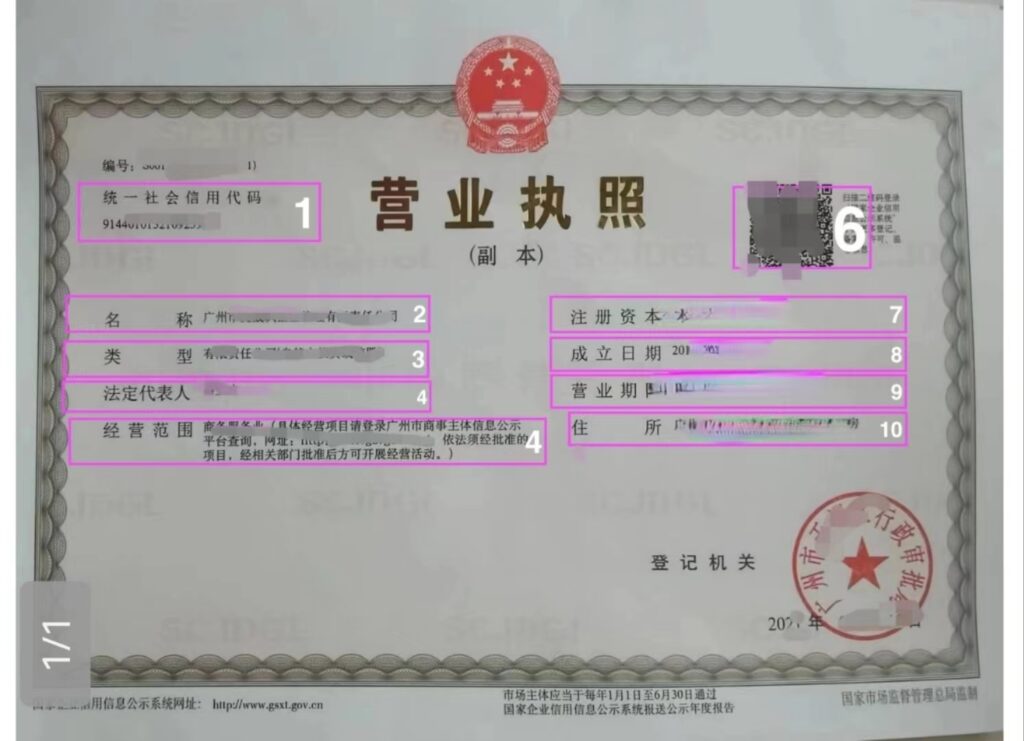Just like a birth certificate for an individual, a business license serves as a company’s identification certificate upon incorporation. It signifies the official establishment of the company and enables the completion of other formalities such as opening a bank account, tax registration, filing with the Ministry of Commerce (if necessary), and obtaining company seals.
For those interacting with a company, the business license holds significant importance as it provides essential information about the company. Let’s explore what we can learn from a business license:
1. Unified Social Credit Code:
The Unified Social Credit Code is a unique identification code for a company, comparable to an individual’s ID number. It consists of 18 letters or numbers and remains associated with the company from its incorporation until official deregistration. It should not be confused with the Taxpayer Identification Number (Tax No.), as their purposes differ. The Unified Social Credit Code primarily serves as an identity code for a company.

2. Company Name
While many Chinese companies have an English name, particularly those oriented towards export, it is crucial to remember that all official government documents are issued in Chinese. The business license, except for the name of the legal representative (if foreign), contains all company information in Chinese. Therefore, the official name of a Chinese company is the Chinese name stated on its business license. Knowing a company’s Chinese name is vital to truly claim familiarity with the company.
3. Type of Company
In general, there are two types of business entities in China: corporations and partnerships. Since January 1, 2020, the terms “WFOE” (Wholly Foreign-Owned Enterprise) and “JV” (Joint Venture) are no longer used. Foreign-invested companies are classified as either corporations or partnerships and enjoy the same treatment as Chinese citizens, as long as their business activities do not fall under the negative list for investments.
4. Legal Representative
Further information about the legal representative can be found in our more detailed post: “XXX.”
5. Scope of Business
The business scope specifies the operations and services in which a company can engage. Different types of operations are associated with different types of fapiao (official invoices) that a company can issue. It’s important to note that for certain operations, such as training, education, and catering services, an additional administrative permission is required to engage in these activities legally.
6. QR Code
The QR code allows individuals to access the National Entity Credit Information Publicity system, providing more detailed information about a company, including its registration date, filings, authorizations, and supervision.
7. Registered Capital
For detailed information on registered capital, please refer to our more comprehensive post: “XXX.”
8. Date of Incorporation
The date of incorporation is the day on which the company’s business license is granted, signifying its official establishment.
9. Term
The term refers to the current duration of the company’s existence, usually indefinite.
10. Address
The address listed on the business license corresponds to the company’s headquarters or main office.
All the information on the business license must accurately reflect the company’s ongoing operations and actual situation. In the event of any changes, the company is required to file these changes with the Administration of Industry and Commerce, and an updated business license will be issued accordingly.
Have you ever checked the business license of your supplier or business partner?


2 Comments.
[…] a company incorporated in mainland China, is different. ( You may check our post: What Can We Learn from a Business License? to know […]
[…] business licenses examine it ( If you know need more information, please check our previous post: What Can We Learn from a Business License?). Look for information on the license such as the year the company was formed, its location, and […]